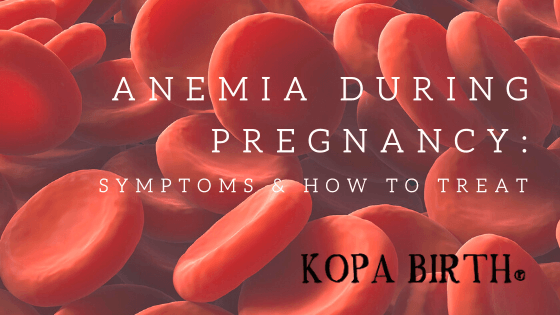
Many pregnant women are diagnosed with anemia. Mild anemia during pregnancy is common, but maybe you’ve just been told that yours is more severe. So, what is anemia, and what causes it? How will you know if you have it? And how is it treated if you do? Let’s explore the ins and outs of anemia during pregnancy.
Estimated reading time: 6 minutes
Anemia is often described as a condition where your body doesn’t have enough red blood cells or enough iron. These statements are both true, but indicate different forms of anemia.
Iron-deficiency anemia is the most common form of anemia during pregnancy. Hemoglobin is the protein in red blood cells that carries oxygen to other cells in your body, and iron is needed to make hemoglobin (2). So, iron-deficiency anemia occurs when your body doesn’t have enough iron to produce adequate amounts of hemoglobin (1). This results in less-than-optimal amounts of oxygen traveling to your cells, which can affect both your organs and tissues, as well as the cells of your developing baby.
Folate is a vitamin found in leafy green vegetables, and is also inserted as a supplement in your prenatal vitamin. B12 is a naturally-occurring vitamin found in meat, dairy, and eggs.
Both folate and B12 are necessary to the production of new red blood cells. If mom is not getting enough folate or B12 in her diet, she may not make enough red blood cells to carry oxygen throughout the body.
During pregnancy, your blood volume significantly increases to meet the needs of your growing baby (2). In turn, your body needs to make more red blood cells to carry more oxygen. The amount of iron and vitamins that you have stored in your body may not be enough to support the increased need to carry oxygen. (Most pregnant women take a prenatal vitamin, but sometimes that alone is still not enough to prevent anemia.) If the supplementation of iron, folate, or B12 is inadequate, anemia can develop.
While certainly not everyone develops anemia during pregnancy, it’s not particularly uncommon either. Your chances of becoming anemic (or entering pregnancy anemic) increase under the following conditions:
Sometimes, though, women experience anemia without any of these factors.
If you become anemic during pregnancy, you may experience any or all of these symptoms: (2, 3, 4)
Of course, some of these symptoms occur in pregnancy for other reasons, and alone do not indicate anemia. Feeling them to a higher degree than is typical may suggest that you might be anemic. Communicate your symptoms to your healthcare provider. While screening for anemia is routine at certain stages of the pregnancy, your doctor will be able to determine if additional testing would be beneficial.
Screening for anemia is routinely included in the blood work performed at your first full prenatal appointment in the first trimester. Screening tests are done again early in the third trimester, at your 28-week appointment (3). If the tests reveal that your hematocrit (proportion of red blood cells in your blood) is lower than 37 and your hemoglobin is under 12, you may be diagnosed with anemia (1).
It is recommended that while pregnant, you get at least 27 milligrams of iron a day, from either diet or supplements (5).
The best way to prevent anemia or to treat mild anemia during pregnancy is by eating a diet that contains foods rich in iron. This includes: (3, 4, 5)
Most prenatal vitamins contain iron. However, in some cases, your doctor or midwife may recommend an iron supplement in addition to a healthy diet and prenatal vitamin. If you need to take an iron supplement, here are some things to know:
Sometimes, particularly if your anemia is severe, your doctor or midwife may recommend iron IV infusions instead of oral supplements. One of the benefits of an IV infusion is that it produces a faster rise in hemoglobin than oral supplements. The other major benefit is that IV iron infusions are less likely produce the challenging gastrointestinal symptoms that many women experience with oral supplements (6). If your provider recommends IV iron infusions, you may want to take a look at this resource to learn about what to expect.
If you’re anemic when you go into labor, the blood loss associated with delivery can sometimes cause anemia, especially if mom experiences postpartum hemorrhage (4). The risk is greatest in a delivery of multiples, because the uterus is over distended and the size changes rapidly after delivery.
Postpartum anemia is usually treated with supplements, but is serious (though rare) cases a blood transfusion may be necessary (4, 1). If you do experience postpartum anemia, try to line up plenty of help at home with baby care and housework as you may tire very easily. You may also become lightheaded or dizzy when getting up from a lying or sitting position, so move slowly and consider picking up your baby after standing rather than standing while holding him or her.
Ultimately, it’s important to remember that anemia is highly treatable and is rarely a cause for serious concern. It’s important to eat a healthy diet and take supplements as recommended by your healthcare provider. But typically, anemia isn’t something that should cause undue worry. And if you’d like to learn more about anemia during pregnancy, check out this helpful guide from the American Society of Hematology.
Kopa Birth’s online birthing classes allow you to prepare for a natural hospital birth from the comfort of your own home, 24/7. Enroll today in our free online childbirth class and start preparing for your natural birth!
References:
Many pregnant women are diagnosed with anemia. Mild anemia during pregnancy is common, but maybe you’ve just been told that yours is more severe. So, what is anemia, and what